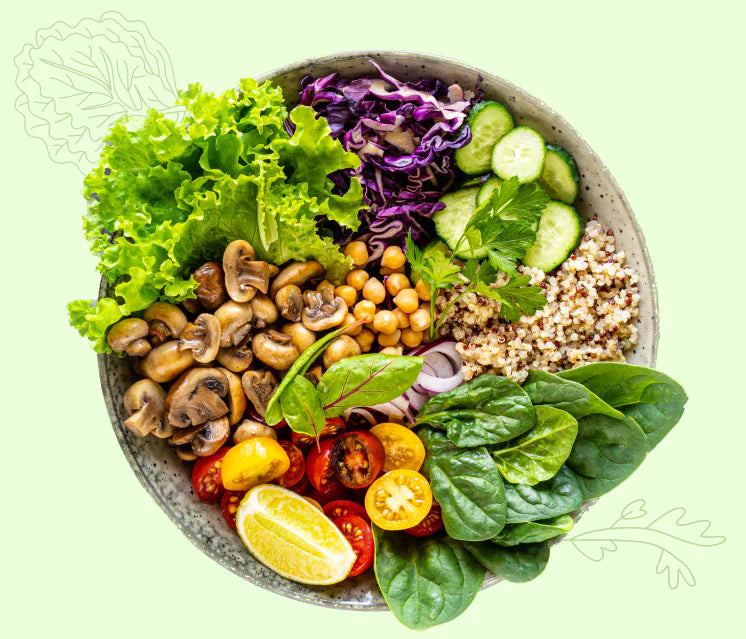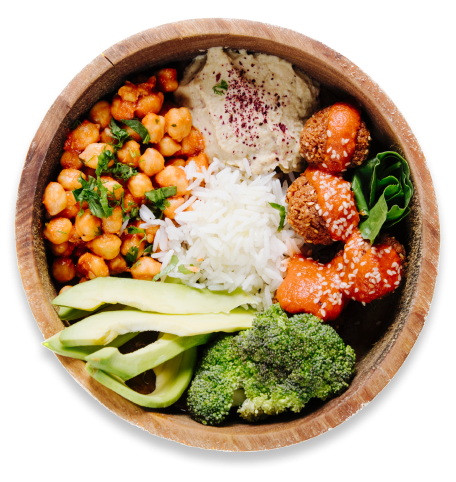Call Us 123456789
Free delivery on order over $200
A Guide to Plant-Based Proteins: Best Sources for Vegans
Buy meal plan
Contrary to popular belief, it’s easy to get the necessary protein on a vegan diet by including a variety Vegan Meal Plans. With a focus on diverse plant protein sources, vegans can enjoy balanced meals without relying on animal protein. In this guide, we’ll explore the best vegan protein sources, debunk myths about plant-based protein diets, and highlight some delicious protein-packed dishes from Plant Power’s meal delivery in Dubai.
Why Protein is Essential
Protein is a crucial macronutrient that plays a key role in maintaining overall health by aiding tissue repair, supporting immune function, and promoting muscle growth. Many people believe that animal protein is the only way to achieve optimal protein intake, but this is a misconception. Numerous vegan foods offer rich sources of protein. Plant proteins, like those found in legumes, grains, seeds, and nuts, contain essential amino acids that your body needs to thrive.
While it’s true that some plant proteins don’t contain all the essential amino acids individually, combining different protein sources allows vegans to meet their nutritional needs fully. With options like tofu, tempeh, quinoa, and lentils, vegans can easily create meals with complete proteins. At Plant Power, we offer a variety of protein-rich dishes, making it easy for vegans to meet their daily protein needs without any hassle.
Top Plant-Based Protein Sources
Here are some of the best plant protein sources for vegans, each of which can be incorporated into a balanced vegan diet:
1. Legumes
Legumes, including black beans, lentils, and pinto beans, are nutrient powerhouses. For example, one cup of cooked lentils delivers approximately 18 grams of protein. Not only do legumes provide ample protein, but they also contain fiber, which promotes heart health and helps maintain stable blood sugar levels. At Plant Power, we offer tasty dishes featuring legumes, making it easy and enjoyable to add this protein source to your meals.
Apart from providing protein, legumes are also rich in iron, potassium, and folate. These nutrients play vital roles in supporting your immune system, enhancing energy levels, and maintaining healthy cell function. The versatility of legumes also makes them an excellent addition to soups, stews, salads, and even snacks.
2. Grains
Grains such as brown rice, wild rice, and quinoa are excellent plant protein sources. Quinoa, in particular, is known as a complete protein because it provides all nine essential amino acids in one serving. In addition to being a great protein source, these grains are versatile and can be enjoyed in various dishes. Plant Power offers certain meals that incorporate quinoa and brown rice, providing a satisfying texture along with a protein punch.
In addition to their protein content, whole grains like quinoa and brown rice are rich in fiber, which aids digestion and promotes long-lasting fullness. These grains also provide B vitamins, which are essential for converting food into energy and supporting brain function. Including quinoa and brown rice in your meals adds both nutritional value and variety to your diet.
3. Nuts and Seeds
Nuts and seeds, such as almonds, walnuts, hemp seeds, chia seeds, and pumpkin seeds, are good sources of protein and healthy fats. Just two tablespoons of hemp seeds can add up to 10 grams of protein to your diet, making them perfect for adding to smoothies, salads, or oatmeal. Other seeds like sunflower, flax, and sesame also contribute to plant protein intake while adding a delightful crunch to your meals.
Not only do these foods provide protein, but they’re also packed with other essential nutrients, such as omega-3 fatty acids and antioxidants. Omega-3s, found in seeds like chia and flax, are beneficial for heart health, while antioxidants help protect the body from oxidative stress. Nuts and seeds are also rich in vitamin E, which supports healthy skin and immune function.
4. Tofu and Tempeh
Made from soy, tofu and tempeh are versatile meat substitutes for vegans. Tofu provides around 10 grams of protein per half-cup serving, while tempeh, which is fermented, offers even higher protein content and comes packed with probiotics. Both of these protein products are complete proteins. At Plant Power, we incorporate these ingredients into dishes like our Mixed Veg Stir Fry on Cauliflower Rice, creating a balanced and flavorful meal that meets your protein needs.
In addition to their protein content, tofu and tempeh are rich in calcium, iron, and magnesium. These minerals are essential for maintaining healthy bones, supporting muscle function, and regulating blood pressure. Fermented tempeh also offers digestive benefits, as it contains probiotics that support gut health.
5. Seitan
Seitan, made from gluten, is one of the most protein-dense plant-based options available, with about 25 grams of protein per 3.5-ounce serving. Although it doesn’t contain all essential amino acids, pairing seitan with other protein sources can help create a well-rounded vegan meal. Known for its meat-like texture, seitan is a popular choice in vegan dishes. Plant Power’s Seitan Capsicum Chilli with Gluten-Free Spaghetti is a filling, high-protein meal that satisfies cravings while delivering nutritional benefits.
Seitan is also rich in iron and selenium, which are crucial for maintaining energy levels and supporting immune function. However, it’s important to note that seitan is not suitable for those with gluten sensitivities or celiac disease. For those who can enjoy it, seitan offers a chewy texture and a satisfying, savory flavor that’s ideal for stir-fries, sandwiches, and vegan "meatballs."
Debunking Protein Myths
A common myth is that vegans can’t meet their protein needs without animal protein. In reality, by consuming a variety of plant protein sources such as grains, legumes, nuts, and seeds, vegans can obtain all the essential amino acids necessary for muscle growth and maintenance. Combining foods like rice and beans or hummus and pita provides a complete protein profile, meeting all essential amino acid requirements.
Another misconception is that plant proteins are inferior to animal proteins in terms of quality. While animal proteins do contain a full amino acid profile, plant-based diets can still provide adequate nutrition through careful planning and a wide variety of vegan foods. By diversifying your diet and including various protein products, you can achieve optimal health and fitness on a vegan diet.
Nutritional Benefits of Plant-Based Proteins
Opting for plant proteins over animal protein offers several health benefits:
- Heart Health: Plant-based diets tend to be lower in saturated fats and cholesterol, which supports cardiovascular health and may reduce the risk of heart disease. Additionally, plant proteins contain more antioxidants and fiber, which promote a healthy heart.
- Lowered Risk of Chronic Diseases: Vegan diets are associated with lower risks of hypertension, type 2 diabetes, and certain types of cancer. By reducing the intake of animal products and increasing the consumption of plant-based foods, you can boost your immunity and decrease inflammation in the body.
- Environmental Impact: A diet based on vegan foods helps reduce the environmental footprint, as plant-based protein production generally requires less water, land, and energy compared to animal protein production. By embracing plant proteins, you can contribute to a more sustainable planet and reduce your carbon footprint.
Choosing plant-based proteins offers the opportunity to enjoy a varied diet that supports both personal health and environmental sustainability.
Incorporating Protein into a Vegan Diet
Ensuring sufficient protein on a vegan diet can be simple and enjoyable. Here are some practical ways to increase plant protein intake daily:
- Batch Cooking: Prepare large portions of protein-rich legumes and grains, like lentils, black beans, and rice protein. Having these ready in the fridge makes it easy to add a protein boost to any meal throughout the week.
- Use Protein-Rich Add-ins: Sprinkle chia seeds, hemp seeds, and nut butters on your salads, smoothies, or breakfasts for an easy protein source that adds both flavor and texture.
- Protein-Rich Snacks: Keep snacks like almonds, pumpkin seeds, and soy protein bars on hand. These are convenient and can help you meet your plant protein intake targets between meals.
- Meal Delivery: For those with busy lifestyles, Plant Power’s meal delivery in Dubai offers convenient access to balanced, high-protein vegan meals, making it easier than ever to enjoy nutrient-dense dishes without having to cook.
By incorporating these strategies into your daily routine, you can easily meet your protein needs while enjoying a variety of delicious and nutritious meals.
Delicious Protein-Packed Dishes from Plant Power
At Plant Power, we offer a diverse selection of high-protein, plant-based dishes to help you meet your daily protein goals. Here are a few standout meals from our menu:
- Chili Con Veg with Brown Rice: A hearty, satisfying dish packed with legumes like black beans and lentils, offering a significant protein boost while keeping your meal gluten-free. Brown rice provides additional plant proteins and fiber for a filling meal.
- Freekeh, Chickpea, and Edamame Salad: This refreshing salad combines protein-rich grains and legumes, delivering a balanced meal that’s both flavorful and nutritious.
- Seitan Capsicum Chilli with Gluten-Free Spaghetti: Made with seitan, this dish provides a substantial amount of protein along with the flavors of capsicum and gluten-free pasta, making it a comforting and protein-packed choice.
- Hearty Quinoa Waffles: A unique breakfast option, these waffles are made with quinoa, a complete protein. This dish provides sustained energy and protein to kickstart your day with a delicious twist.
These meals ensure you get a balanced intake of plant-based proteins, whether you’re fueling up post-workout or simply enjoying a nutrient-rich meal.
Conclusion
With the right combination of foods, meeting your protein requirements on a vegan diet is both simple and effective. Incorporating a wide variety of plant-based protein foods such as legumes, grains, nuts, and seeds can help you stay energized and healthy. At Plant Power, we provide a range of plant-based meals designed to meet your protein needs without sacrificing flavor or convenience.
Embracing a vegan diet doesn’t mean sacrificing protein. With options like lentils, quinoa, tofu, and tempeh, vegan diets offer plenty of high-quality protein sources. Ready to fuel your body with protein-packed meals? Explore our menu today and enjoy the benefits of high-protein, delicious vegan meals delivered straight to your door.
What are you waiting for?
It’s time to kickstart your health journey with nourishing and delicious meals to boost your energy and overall health!
